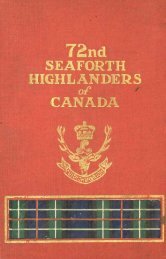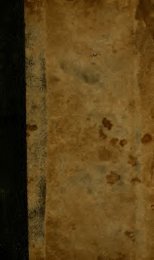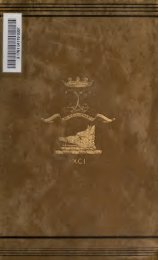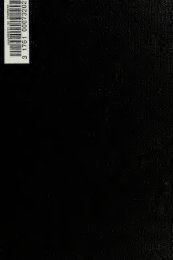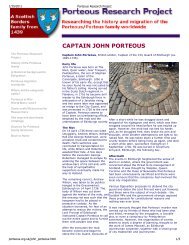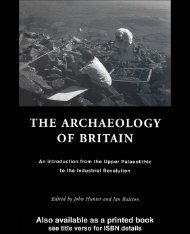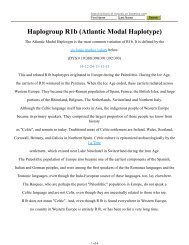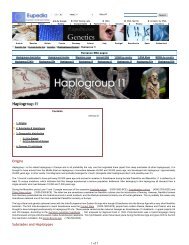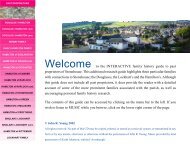Wedderburn book; a history of the Wedderburns in ... - waughfamily.ca
Wedderburn book; a history of the Wedderburns in ... - waughfamily.ca
Wedderburn book; a history of the Wedderburns in ... - waughfamily.ca
Create successful ePaper yourself
Turn your PDF publications into a flip-book with our unique Google optimized e-Paper software.
liiv. THE WEDDKllUl'llN BOOK.<br />
totrod. <strong>the</strong>n past e<strong>in</strong>rhty years <strong>of</strong> a^e, whom he satisfied himself was <strong>the</strong> son <strong>of</strong><br />
this John WeJderburu. Charles' story ran that his fa<strong>the</strong>r had at one time<br />
taken <strong>the</strong> life <strong>of</strong> a student at S. Andrew's, and had fled to Edit, where<br />
he died <strong>in</strong> 1744, hav<strong>in</strong>g married <strong>in</strong> 1737, and left two sons, Charles and<br />
John. There are various difficulties <strong>in</strong> <strong>the</strong> way <strong>of</strong> accept<strong>in</strong>g <strong>the</strong> identity<br />
<strong>of</strong> Charles' fa<strong>the</strong>r with <strong>the</strong> sou <strong>of</strong> Peter Wedderburu and Cathar<strong>in</strong>e Man,<br />
with which I have dealt at pp. 222-2S <strong>of</strong> this volume. If it and <strong>the</strong><br />
rest <strong>of</strong> J.W.'s account <strong>of</strong> Charles <strong>Wedderburn</strong> ia Perth could be accepted,<br />
we should be able to exhaust <strong>the</strong> male descent from Pote.-'s second .son, for<br />
it seems that Charles <strong>Wedderburn</strong> "s own sons died s.p , while his liro<strong>the</strong>r<br />
John, who settled at Camno, near Meigle, is clearly proved to have had but<br />
one son, Robert, <strong>the</strong> elder <strong>of</strong> whose two sons, 'llohert Niel <strong>Wedderburn</strong>,<br />
died without issue <strong>in</strong> 1873, while <strong>the</strong> vouuger, John, had died unmarried<br />
<strong>in</strong> 1868.<br />
I return from <strong>the</strong>se matters <strong>of</strong> doubt to to take up <strong>the</strong> clear stoty<br />
°^ *'-^? families descended from old Sir Alexander's<br />
Sir John<br />
two eldest<br />
flrat<br />
baronet <strong>of</strong> " surviv<strong>in</strong>g sons, John and James, who <strong>in</strong>herited from or through<br />
di'ldlTol^ ^^°*' t^^'"" fa<strong>the</strong>r <strong>the</strong> one <strong>the</strong> e.sUite <strong>of</strong> Blackness, and <strong>the</strong> o<strong>the</strong>r <strong>the</strong><br />
clerkship <strong>of</strong> Dundee. John, who was born <strong>in</strong> 1C41, was<br />
admitted an advo<strong>ca</strong>te, and at one time was stand<strong>in</strong>g counsel to his native<br />
burgh. I do not know if he ever had a large practice, but <strong>in</strong> 1GS3, after<br />
eighteen years at <strong>the</strong> Bar, he was appo<strong>in</strong>ted one <strong>of</strong> <strong>the</strong> pr<strong>in</strong>cipal clerks<br />
to <strong>the</strong> bills, and it was, I presume, for his services <strong>in</strong> that <strong>ca</strong>pacity that<br />
he was created a baronet <strong>of</strong> Nova tjcotia (with rema<strong>in</strong>der to his heirs male)<br />
by Queen Anne <strong>in</strong> 1704. There is ground for th<strong>in</strong>k<strong>in</strong>g that he owed this<br />
h(mour paitly to <strong>the</strong> <strong>in</strong>fluence <strong>of</strong> his cousiu, Alexander Wedtlerbnrn, .sou to<br />
Lord Gosford, <strong>the</strong>n much about <strong>the</strong> Court, and exert<strong>in</strong>g him.seif <strong>in</strong> favour <strong>of</strong><br />
<strong>the</strong> union between Scotland and England. Sir John must have resided lar'^elv<br />
<strong>in</strong> Ed<strong>in</strong>burgh, but he was, no doubt, also much at Blackness, where" he<br />
erected a new entrance, and <strong>in</strong> Dundee, where he built a seat for himself<br />
and his family <strong>in</strong> <strong>the</strong> west church. He died early <strong>in</strong> 170G, liav<strong>in</strong>"- had<br />
issue by his wife, Kachel Dunmiiir ((laughter <strong>of</strong> Mr. David Dunmnir, ad\-o<strong>ca</strong>te)<br />
whom he married <strong>in</strong> 1GG7 and who died Ix-fore Hi'J'), a faiuilv <strong>of</strong> eleven<br />
children, <strong>of</strong> whose births he, like his fa<strong>the</strong>r, left a holograph re"ister. Of <strong>the</strong>se<br />
children <strong>the</strong> five youngest <strong>of</strong> seven sons and <strong>the</strong> eldest and youngest <strong>of</strong> four<br />
daughters died when quite young; <strong>the</strong> four rema<strong>in</strong><strong>in</strong>g children be<strong>in</strong>" Alexander<br />
who succeeded his fa<strong>the</strong>r; David (born 1G74), who enteied <strong>the</strong> army and fell<br />
at <strong>the</strong> siege <strong>of</strong> Douay <strong>in</strong> 1710, ei<strong>the</strong>r unmarried or without issue; Margaret,<br />
who was twice married, (1) to Andrew B.ill'our and (2) Dr. Willijim Ec-C'les<br />
•'<br />
and, f<strong>in</strong>ally, Mathilda, who married David Campbell, younger, <strong>of</strong> Kethick near<br />
Coupar-Angus, and left issua<br />
Sir Alexander Wedderiiurn, second Iwironct <strong>of</strong> Blackness, was born <strong>in</strong> 1G72<br />
and was edu<strong>ca</strong>ted at S. Andrew's. I do not f<strong>in</strong>d that he wa.s<br />
SirAiexMder gyer <strong>ca</strong>lled to <strong>the</strong> Bar. but iu 1701 he was admitted "clerk<br />
ot^Biackness!® to <strong>the</strong> bills on a con<strong>in</strong>ii.s.siou frao <strong>the</strong> Earl <strong>of</strong> Selkirke, Renister,<br />
df/diTia' and his fa<strong>the</strong>r's demission to half <strong>the</strong> <strong>of</strong>fice," after which he<br />
largely resided <strong>in</strong> Ed<strong>in</strong>liur-h, where he hail a house <strong>in</strong> Trotter's<br />
close, until his fa<strong>the</strong>r's death, when he NULvettied to Blackness and a house<br />
<strong>in</strong> <strong>the</strong> IS'e<strong>the</strong>rgait <strong>of</strong> Dundee. He beems to have a tiste for <strong>book</strong>-collect<strong>in</strong>",<br />
as we f<strong>in</strong>d accounts amount<strong>in</strong>g to over £boO for <strong>book</strong>s bought by him from<br />
a s<strong>in</strong>gle Ed<strong>in</strong>burgh <strong>book</strong>seller with<strong>in</strong> two or three years ot his death. }Jo<br />
added to his estate by <strong>the</strong> j>urcha*e <strong>of</strong> Logie from <strong>the</strong> town <strong>of</strong> Dundee, as<br />
' There wm i>sue cf both thow nLtrriaj^r*. Uixt nf thr Crut <strong>in</strong>cluil<strong>in</strong>;; i<strong>in</strong> only »ur%iviiig<br />
Margaret IJ/ilfour, who married her cutu<strong>in</strong>. Dr. Jyl<strong>in</strong> Wed.lerbuni ot Mvies, aaJ ihcJ t,\>.<br />
iliild<br />
Sew<br />
i>. post, Ixvu


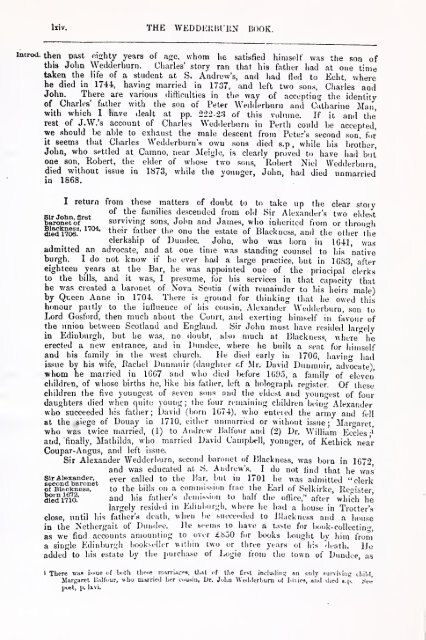
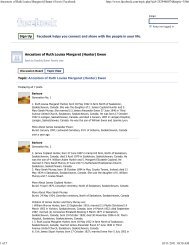
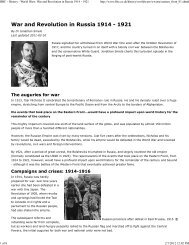
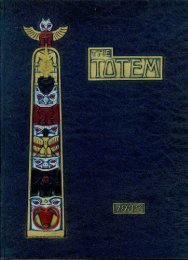
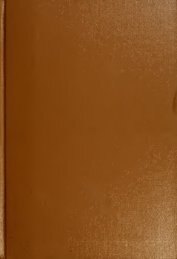
![SS Sir Francis [+1917] - waughfamily.ca](https://img.yumpu.com/49438251/1/190x245/ss-sir-francis-1917-waughfamilyca.jpg?quality=85)
